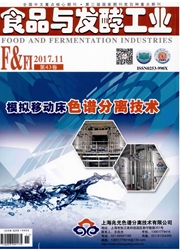

 中文摘要:
中文摘要:
对11种中草药醇提物抑制柑橘意大利青霉的抑菌效果进行筛选,选用抑菌效果最佳的桂枝提取物从其对病原菌的孢子萌发率、细胞膜渗透性、菌丝形态及菌体内含物含量的影响来进行抑菌机理的研究。结果表明:桂枝、桂皮和黄柏提取液的抑制圈直径均大于30 mm,具有较好的抑菌效果。其中桂枝的抑菌活性最佳,对意大利青霉的抑制圈直径为(34.57±0.78)mm,最小抑菌浓度(MIC)和最小杀菌浓度(MFC)分别为3.125和6.25 mg/mL,且抑菌效果显著优于化学杀菌剂百可得。在抑菌机理方面,桂枝提取物可以抑制意大利青霉菌孢子萌发,影响菌丝的生长发育,其抑菌作用主要是通过破坏细胞膜结构,增加菌体细胞膜通透性,使菌体内容物外渗从而影响菌丝正常生长代谢来实现的。桂枝提取物对柑橘青霉菌有较好的抑菌活性,可作为天然杀菌剂的来源。
 英文摘要:
英文摘要:
Herein, the ethanol-extracts from 11 Chinese herbs were screened for their antifungal activities against Penicillium italicum. The extract from Ramulus cinnamomi showed the best antifungal activity against P. italicum and was chosen to study the antifungal mechanism. The spore germination, cell membrane permeability, mycelium morphology and mycelia inclusion contents were used to explain its potential mechanism. The results suggested that the ethanol extracts of R. cinnamomi, Cinnamomum japonicum and Cortex phellodendri showed good antifungal effects and their inhibition zones were all over 30 mm. Moreover, R. cinnamomi showed the best antifungal activity in all 11 herbs and was better than Bellkute (a chemical fungicide used in Citrus Postharvest Disease). The inhibition zone of R. cinnamomi was 34.57 ± 0.78 mm, meanwhile, the minimum inhibitory concentration (MIC) and the minimum fungicidal (MFC) concentrations were 3. 125 mg/mL and 6.25 mg/mL, respectively. In addition, the antifungal mechanism suggested that R. cinnamomi extracts had interference effect on spore germination, mycelial growth and development, because it could effectively inhibit spore germination and damage the normal structure and stability of cell membrane. The increased permeability of cell membrane led to exosmose of mycelial contents, and then affected the growth and metabolism of mycelium. Ethanol-extract from R. cinnamomi showed good antifungal activity against citrus blue mould and thus could be used as a source of natural fungicides.
 同期刊论文项目
同期刊论文项目
 同项目期刊论文
同项目期刊论文
 Antioxidant and Antimicrobial Properties of Various Solvent Extracts from Impatiens balsamina L. Ste
Antioxidant and Antimicrobial Properties of Various Solvent Extracts from Impatiens balsamina L. Ste Screening and identification of antagonistic bacteria with potential for biological control of Penic
Screening and identification of antagonistic bacteria with potential for biological control of Penic Control of Postharvest Blue Mold of Nanfeng Mandarin by Application of Strain YS-1 Paenibacillus bra
Control of Postharvest Blue Mold of Nanfeng Mandarin by Application of Strain YS-1 Paenibacillus bra 期刊信息
期刊信息
